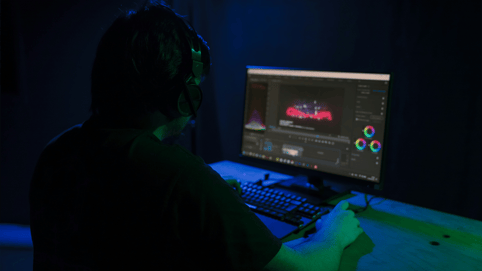While creating video content for companies has never been easier, there are still several ways in which it can be tricky. One area that causes a lot of freelance creators and producers more than a few headaches has to do with music—and specifically music licensing basics like understanding who holds the rights to music and how those rights affect your projects.
You most likely know, or at least have a basic understanding, that you can’t just use any mainstream music in videos or content for commercial use unless you have obtained the rights to do so.
What often becomes unclear in these situations is who actually owns the music rights, who is responsible for obtaining the proper licenses, and who must ensure that your content is cleared, protected, and free from potential copyright infringement.
If you’ve ever wondered who actually holds the rights to your projects, this guide will walk you through everything you need to know to ensure your music license protects your company or client—not just you.
Some music licensing basics
To fully explore this subject, we need to cover some basics of music licensing first. Simply put, all music has natural copyrights associated with it. These copyrights cover both the composition and the recording of the music.
For a deeper look into how music copyrights work, and how they’ve evolved, check out this article on music copyright.
However, what’s often overlooked is that even with a proper license, music rights only apply to the specific licensee. While these rights typically include the permissions needed to use the music, they do not automatically extend to others.
Just because you’ve properly licensed music for a video or other marketing purpose, it doesn’t mean that you, as the licensee, can use the licensed music however you want. The licensee is liable to properly use the assets, and they will also bear the responsibility and risk if the music is misused.
Related reads:
Even the biggest brands have been hit with lawsuits over music licensing mistakes—learn why.
The importance of assigning licenses to the correct party
Freelancers, agencies, and content creators should ensure that the business or commercial music license is assigned directly to the client rather than themselves. This establishes clear ownership of the music rights.
For example, if you’re creating content for a brand, the license should be assigned to the brand since it will be the responsible party for any promotional use.
This will help minimize any risks or consequences that may arise if materials are misused in the future. It also helps your clients better understand and manage their licensing, as well as how to protect themselves effectively.
What to look for in a music license
Now that we’ve gone over why you, as a freelance content creator, agency, or producer, might want to properly assign licenses to the correct party, let’s explore how you can actually do this. In essence, anyone can achieve this by identifying music licensing services that include transferability and named-license language in their contracts.
For example, Soundstripe’s Digital, Expanded, and All Media licenses provide options that allow agencies and freelancers to assign the license directly to their clients.
How to ensure proper music licensing for businesses
For freelancers or small teams working with similarly sized brands, the most common first step is often to purchase single-use licenses and assign them to the company.
If you’re a freelancer or agency, you can also direct your client to a pre-cleared music library like Soundstripe’s and put the power in their hands to pick the music they like and license it themselves.
However, for larger brands and projects, the best option would be for them to explore Soundstripe’s business and enterprise options. If you’re curious about what Soundstripe’s Enterprise Plan is and how it works, read this guide on how to access unlimited music, sound effects, video, and legal peace of mind.
Protect yourself and your clients
At the end of the day, you, your clients, and any reputable music licensing company all want the same thing. It’s to provide high-quality music that fairly compensates the artists and musicians who composed and recorded these awesome tunes.
Further protect yourself and your clients by reading up on these other music licensing issues and resources on the Soundstripe blog below.
- How to License Music for Video
- Soundstripe's Music Library Grew 80% in 2024: How We Turned Up the Volume on Commercial and Production Music
- Navigating Music Licensing Costs with Clients: A Guide for Creatives
- The Business of Music Licensing, and Why "Royalty Free Music" Doesn't Need to be a Bad Word





